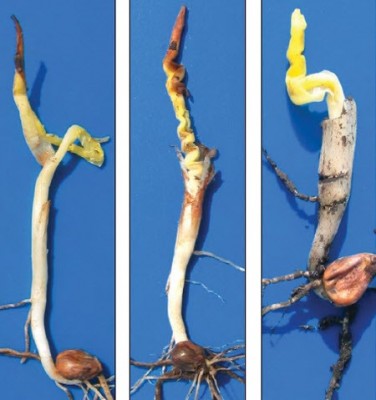How warm are your soils? Things to consider prior to planting
Joshua Putman, Field Crops and Forage Specialist
Southwest New York Dairy, Livestock and Field Crops Program

The sun is shining, grassing is greening up, and some recent warm temperatures have everyone excited about planting. However, there are other things to consider as we move further into the spring. Imbibition is the process by which seeds absorb water for the initiation of germination. A chilling effect occurs when water colder than 50 degrees F is imbibed. The imbibition of cold water disrupts the reorganization of cells during rehydration and can result in the loss of seed vigor or seed death. The most critical time for imbibition is within 24 hours of planting. Therefore, imbibitional chilling effects are more severe when seeds are planted into soils 50 degrees F or colder compared to planting into warmer soils followed by a drop in temperature. Recent soil temperatures taken by Field Crops Specialist, Josh Putman, indicate soil temperatures in Southwest New York are around 40-50 degrees F depending on the soil type. In SWNY, we recently had snow as well as a hard frost which can be damaging or lethal to a corn or soybean crop. It is important to monitor soil conditions before planting to avoid loss of stand or the potential to significantly reduce your crop yields. Additional information about seed imbibition can be found through the following link.
Upcoming Events
Crops, Cows & Critters - Southwest New York Dairy, Livestock & Field Crops Newsletter Sponsorship
December 19, 2025
Our two forms of publications feature research-based and timely information from our four specialists, listed to the right, along with local event notifications and Cornell University outreach. This information is provided to participants who range from dairy, livestock, and field crops producers to agricultural suppliers and consultants.
Weekly Email Update: Shared with 625+ households who have signed up with our program.
Monthly Paper Mailer: To reach our stakeholders and farmers who lack internet access, we send out a monthly mailer where your company's logo and contact information would be featured with a mailing list of 330+ households.
If you sponsor our weekly and monthly publications you reach approximately 955 households.
Visit our website to view our newsletters!
2025 Cornell Food Beverage & Animal Feed Manufacturer Survey
December 19, 2025
Industry and Educational Advocates for New York State's Food, Beverage, and Animal Feed Manufacturing industries:
As you know, NYS has a diverse food and beverage manufacturing industry, in both the types of industries that exist and the wide distribution of firms by scale. Many manufacturing firms have strong backward linkages to agricultural production sectors in the state that support both farm-level and downstream food industry firms and consumers. In collaboration with the New York State Department of Agriculture and Markets, a team from Cornell University's Charles H. Dyson School of Applied Economics and Management has recently rolled out the 2025 New York State Food, Beverage, and Animal Feed Manufacturer Survey. The industry will benefit from an updated assessment of the industry that informs private and public investments and opportunities to support firm growth and improved profitability.
Boots in the Barn: Cornell Dairy Research Updates
January 13, 2026
January 20, 2026
January 27, 2026
February 3, 2026
February 10, 2026
February 17, 2026
February 24, 2026
Join us for some or all!
Announcements
No announcements at this time.





